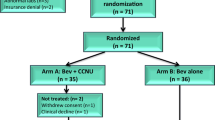Abstract
Meningiomas that progress after standard therapies are challenging with limited effective chemotherapy options. This phase II trial evaluated the efficacy of everolimus plus bevacizumab in patients with recurrent, progressive meningioma after treatment with surgical resection and local radiotherapy when appropriate. Patients with recurrent meningioma (WHO grade I, II, or III) following standard treatments with surgical resection and radiotherapy received bevacizumab (10 mg/kg IV days 1 and 15) and everolimus (10 mg PO daily) each 28 day cycle. Evaluation of response occurred every 2 cycles. The primary endpoint was progression-free survival (PFS). Secondary endpoints included response rate, overall survival and safety. Seventeen patients with a median age of 59 years (29–84) received study treatment. WHO grades at study entry included: I, 5 (29 %); II, 7 (41 %); III, 4 (24 %); unknown, 1 (6 %). Patients received a median of 8 cycles (1–37); all patients are off study treatment. A best response of SD was observed in 15 patients (88 %), and 6 patients had SD for >12 months. Overall median PFS was 22 months (95 % CI 4.5–26.8) and was greater for patients with WHO grade II and III compared to grade I tumors (22.0 months vs 17.5 months). Four patients discontinued treatment due to toxicity (proteinuria, 2; colitis, 1, thrombocytopenia, 1). However, other grade 3 toxicity was uncommon, and no patient had grade 4 toxicity. The combination of everolimus and bevacizumab was well-tolerated, and produced stable disease in 88 % of patients; the median duration of disease stabilization of 10 months (2–29). The median PFS from this prospective trial was similar to previous retrospective reports of bevacizumab in the treatment of recurrent meningioma.



Similar content being viewed by others
References
Whittle IR, Smith C, Navoo P, Collie D (2004) Meningiomas. Lancet 363:1535–1543
Perry A, Louis D, Scheithauer B et.al (2007) Meningiomas. In: Louis D, Ohgaki H, Wiestler O (eds) WHO classification of tumors of the central nervous system. IARC Press, Lyon, p 164
Wiemels J, Wrensch M, Claus EB (2010) Epidemiology and etiology of meningioma. J Neurooncol 99:307–314
Preusser M, Berghoff AS, Hottinger AF (2013) High-grade meningiomas: new avenues for drug treatment? Curr Opin Neurol 26:708–715. doi:10.1097/WCO.0000000000000035
Pistolesi S, Boldrini L, Gisfredi S et al (2004) Angiogenesis in intracranial meningiomas: immunohistochemical and molecular study. Neuropathol Appl Neurobiol 30:118–125
Reszec J, Hermanowicz A, Rutkowski R (2015) Expression of MMP-9 and VEGF in meningiomas and their correlation with peritumoral brain edema. Biomed Res Int 2015:646853
Otsuka S, Tamiya T, Ono Y et al (2004) The relationship between peritumoral brain edema and the expression of vascular endothelial growth factor and its receptors in intracranial meningiomas. J Neurooncol 70:349–357
Provias J, Claffey K, delAguila L et al (1997) Meningiomas: role of vascular endothelial growth factor/vascular permeability factor in angiogenesis and peritumoral edema. Neurosurgery 40:1016–1026
Yoshioka H, Hama S, Taniguchi E et al (1999) Peritumoral brain edema associated with meningioma: influence of vascular endothelial growth factor expression and vascular blood supply. Cancer 85:936–944
Pachow D, Andrae N, Kliese N et al (2013) mTORC1 inhibitors suppress meningioma growth in mouse models. Clin Cancer Res 19:1180–1189
Kaley TJ, Wen P, Schiff D et al (2015) Phase II trial of sunitinib for recurrent and progressive atypical and anaplastic meningioma. Neuro Oncol 17:116–121
Raizer JJ, Grimm SA, Rademaker A et al (2014) A phase II trial of PTK787/ZK 222584 in recurrent or progressive radiation and surgery refractory meningiomas. J Neurooncol 117:93–101
Nayak L, Iwamoto F, Rudnick J et al (2012) Atypical and anaplastic meningiomas treated with bevacizumab. J Neurooncol 109:187–193
Lou E, Sumrall A, Turner S et al (2012) Bevacizumab therapy for adults with recurrent/progressive meningioma: a retrospective series. J Neurooncol 109:63–70
Furtner J, Schopf V, Seystahl K et al (2016) Kinetics of tumor size and peritumoral edema before during and after systemic herapy in recurrent WHO grade II or grade III menigoma. Neuro Oncol 18:401–407
Hainsworth JD, Shih KC, Shepard GC et al (2012) Phase II study of concurrent radiation therapy, temozolomide and bevacizumab followed by bevacizumab/everolimus as first-line treatment for patients with glioblastoma. Clin Adv Hematol Oncol 10:240–246
Declaration of Helsinki. In: www.wma.net/e/ethicsunit/helsinki.htm, World Medical Association, Ethics Unit 2007
Macdonald DR, Cascino TL, Schold SC Jr, Cairncross JG (1990) Response criteria for phase II studies of supratentorial malignant glioma. J Clin Oncol 8:1277–1280
Kaplan E, Meier P (1958) Nonparametric estimation from incomplete observations. J Am Stat Assoc 53:457–481
Author information
Authors and Affiliations
Corresponding author
Rights and permissions
About this article
Cite this article
Shih, K.C., Chowdhary, S., Rosenblatt, P. et al. A phase II trial of bevacizumab and everolimus as treatment for patients with refractory, progressive intracranial meningioma. J Neurooncol 129, 281–288 (2016). https://doi.org/10.1007/s11060-016-2172-3
Received:
Accepted:
Published:
Issue Date:
DOI: https://doi.org/10.1007/s11060-016-2172-3




